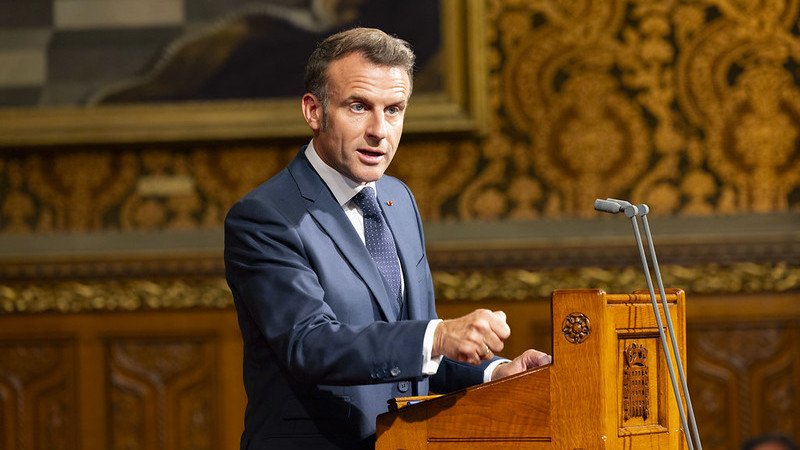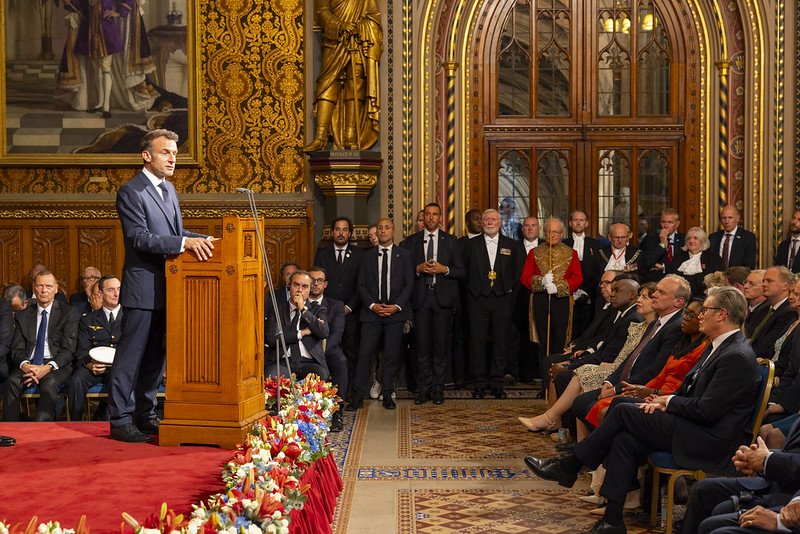French president Emmanuel Macron tells UK parliament Europe must derisk from China, Trump and social media
Emmanuel Macron says the US is not the same as China but has warned that being dependent on both, who were violating international trade law, was dangerous.

Emmanuel Macron has said Europe needed to work “as one” with Britain to derisk from China and the United States, as well as social media algorithms.
Seeking to establish France and post-Brexit Britain as a new driver of European security and a technological force, he said he did not consider the US the same as China but warned that being dependent on both, who were violating international trade law, was dangerous.
He made the call in the first State visit to the UK by a European leader since Brexit — a decision Mr Macron said he found “deeply regrettable” but respected.
Sign up to The Nightly's newsletters.
Get the first look at the digital newspaper, curated daily stories and breaking headlines delivered to your inbox.
By continuing you agree to our Terms and Privacy Policy.The two-day visit, including a banquet hosted by King Charles III and Queen Camilla at Windsor Castle, underscored the greatly improved ties between the UK and France since the EU referendum in 2016 and the change in government from the Conservatives to Labour.
UK Prime Minister Sir Keir Starmer announced that the French would invest in a major new British nuclear plant that was originally intended to include Chinese investment, which has now been shut out.
The pair, the two world leaders Prime Minister Anthony Albanese feels closest to and considers friends, are backing a renaissance in nuclear power as a way of decarbonising their economies, self-sufficiently.
President Macron told the UK Parliament that Europe was at risk of being dependent on China and the US for tech, goods, next-generation technologies such as AI and quantum as well as algorithms that were distorting truth, democracy and the wellbeing of children.
“We will have, as well, to de-risk our two countries for the excessive dependencies on both the US and China,” he told MPs and Lords in the Palace of Westminster’s Royal Gallery.
“I do not put sign equal between China and the US.
“But let’s be realistic.
“On one side, overcapacities and oversubsidies are clear threats of fair trade.
“And they are destabilising a lot of the value chain and creating new dependencies.
“On the other side, a trade war is clearly an explicit decision not to be compliant anymore with the WTO.”

Mr Macron said in order to build a “sustainable future for our children”, Europe must “derisk our economies, and our societies from these dual dependencies.”
He said France wanted an open world and to cooperate, but “not to depend.”
“Each time we depend, each time we are not able to stand up and decide, and agree to disagree, this is the beginning of our problem.
“We are in this situation.”
The European Commission, led by President Ursula von der Leyen, a German and China hawk, has urged capitals to “derisk” from China because of supply chain dependencies exposed during the COVID pandemic.
The EU manages trading terms on behalf of member states and, under President Biden, closely cooperated with the US, but this has fallen away since President Trump’s inauguration.
The EU’s enormous trade imbalance with China was valued at €305 billion ($457b) in 2024, and the bloc and China are engaged in a fierce battle over trade subsidies, with the EU imposing tariffs on state-subsidised electric vehicles made in China — a move driven by the French.
The CCP responded by imposing 35 per cent tariffs on French brandy, although in a ruling last week exempted the major producers Pernod Ricard, LVMH and Remy Cointreau.
But President Macron has struggled to gather similar support for his policy of “strategic autonomy” from America, the EU’s largest trading partner in terms of exports.
But with Donald Trump threatening hefty tariffs on the European Union — which the US president believes was created to “screw” the US’ trading position — President Macron is hoping to tap into allied fears about the stability and reliability of the United States under Trump.
He said the British Netflix television show Adolescence, which examines the toxic and dangerous effects of social media on teenagers — a drama praised by Prime Ministers Starmer and Albanese — showed the need to create technological independence.
“This is the same type of risk — being vulnerable to algorithms designed in the US,” he said.
“Being vulnerable to algorithms designed in China, with social networks not even allowed to Chinese teenagers,” he said, referring to the Chinese-owned platform TikTok.
He said this had made Europe vulnerable to “interferences and misinformation coming from Russia and other places”.
“What is at stake as well today in Europe is the defence of democratic models amid foreign interference, information manipulation, domination of minds by negative emotions, and addictions to social media,” he said.
“The strength of our democracies depends on our capacity to create new regulations in order to better protect our children and our democracies and our democratic debate.
“The relationship with science and truth, otherwise, our future will be decided by those who will decide for this algorithm.”
This was met with sustained applause by MPs.
Poland’s Foreign Minister Radoslaw Sikorski last year told The Nightly that algorithms should be banned.
Europe has struggled to combat disinformation spread on social media, but TikTok in particular.
Last year, Romania, an EU member state, annulled a first-round election after the pro-Russian candidate Calin Georgescu came from nowhere to claim victory.
The move drew sharp criticism from US Vice President JD Vance at the Munich Security Conference in February, who said: “If your democracy can be destroyed with a few hundred thousand dollars of digital advertising from a foreign country, then it wasn’t very strong to begin with.”
Mr Vance used that trip to Germany to meet the leader of the far-right Alternative für Deutschland party leader Alice Weidel a move mirrored by Mr Trump who met Geert Wilders, the leader of the Dutch anti-immigration and hard-right party during the President’s short trip to The Hague for the NATO summit adding to fears in Europe that the Americans are trying to export their MAGA movement across the Atlantic.
Mr Trump defied a bipartisan order to force TikTok to divest from its Chinese ownership or be banned in the United States, praising the app’s role in helping him secure younger voters.
President Macron urged closer cultural relations, easier migration for students and artists and said the French and British — NATO’s two nuclear powers — had to shoulder the responsibility of European security.
He said they had created the Coalition of the Willing — a potential peacekeeping military force comprising Allied and possibly Australian forces — as a signal to show that Europe will never abandon Ukraine.
“And whatever the decisions could be elsewhere,” he said, alluding to the United States.
As part of the two-day State visit, Mr Macron and Sir Starmer are expected to host a call with Coalition of the Willing leaders; however, their joint proposal for an EU-led military mission in Ukraine has been plagued with doubts about its viability and efficacy of any mission.
The war in Ukraine, as well as the change in government from the Conservatives to Labour, which opposed Brexit, has helped smooth tensions between France and Britain.
In a sign of goodwill, negotiations to have the Bayeux Tapestry, which depicts the 1066 Norman conquest of Britain, will be loaned to the British Museum in London, returning the 70-metre cloth to the UK for the first time in 900 years.
“The thrust of Macron’s speech today was an appeal to the UK to throw in its lot with Europe to defend democracy and the rules-based order against threats from Russia and China, but also implicitly from the Trump Administration,” Mujtaba Rahman, Managing Director of EurasiaGroup in Europe, said.
“All in all, it was a powerful and challenging speech which praised Britain but also asked a question – which side will post-Brexit Britain be on as Europe struggles to maintain its prosperity and independence in an increasingly unfriendly world?”
Steve Baker, a former Conservative MP and arch-Brexiteer who lost his seat in last year’s Tory wipeout, praised the speech.
But the former Northern Ireland minister said genuine problems remained regarding the rules in Northern Ireland, which is part of the UK but as part of the Good Friday peace Agreement, has no border with the Republic of Ireland, a member of the EU.
As a result, any goods Great Britain sends to Northern Ireland must provide paperwork to show that they either comply with EU law or will not leave Northern Ireland, and can be subject to customs checks.
“President Macron made a skilful and warm speech, but then the PM just gave him all he wanted,” Mr Baker told The Nightly.
“Alas, that these warm sentiments were not the hallmark of the entire process.
“Northern Ireland will be a running sore until our own law prevails in all parts of our own country.
He predicted that a non-Labour government would pull out of the fisheries trading arrangement, which would in turn trigger the French to collapse economic cooperation with the UK.
“Alas this warmth will not last,” he said.

